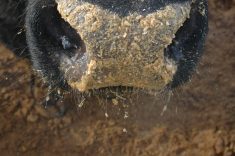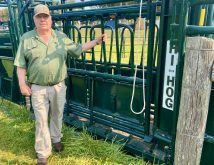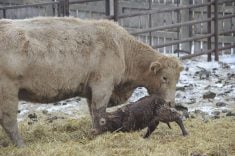Heifers are sometimes confused or indifferent toward their newborn calves. They may ignore their calf or kick when it tries to suckle, prompting the calf to try suckling other cows and causing further confusion.
Dr. Andy Acton of Deep South Animal Clinic in Ogema, Sask., says heifers can be confused if suddenly moved into the barn or a different pen.
“If they’re unfamiliar with the area you put them in for calving, or right after calving, you may disrupt the normal bonding process. Prepare them for this ahead of time, and get them used to where they will be,” he says.
Read Also

New program aims to support plant-based exports to Asia
Understanding the preferences of consumers in Taiwan and how they differ from Indonesia or Malaysia isn’t easy for a small company in Saskatchewan.
“If they’ll be calving in the barn, or you might have to put them in the barn after they calve, take them into the barn a few times before calving.”
Putting a small group of heifers in the barn and letting them eat hay there for 20 minutes can put them at ease so it won’t be as stressful at calving.
Some heifers get nervous and upset by themselves, especially when accustomed to a familiar group, and that could delay calving. Some may be too nervous to mother the calf when they do finally calve. It may help to have a buddy in the adjacent stall or pen so the heifer doesn’t feel isolated.
When cattle are calving in a confined group, curious ones might try to claim a newborn. This interferes with the bonding process.
“Quietly get her into a pen or barn stall with just her calf, as long as she is not trying to kill it,” says Acton.
When calving in pasture, most cows and heifers go off by themselves to give birth and this usually allows bonding time unless another cow tries to claim the calf.
“The heifer will always lose that claiming battle with an older cow, so they should be watched closely prior to calving,” says Acton. “If the heifer is in a smaller area with only a few other heifers, you can quietly grab her and the calf and put them in their own pen and then leave them alone.”
If a heifer is slow to mother the calf or kicks it, it may be necessary to restrain her and help the calf nurse the first time. Once the calf starts nursing, the hormones of milk let-down and mothering usually kick in and the heifer becomes more interested in the calf.
“As soon as you hear that little moo, you know the heifer will mother it,” Acton says.
Heifers that attack their calves are the most frustrating and may require veterinary advice and drugs to calm aggressive animals.
“I like to use acepromazine on those heifers. It’s a tranquilizer and works as an anti-anxiety drug,” says Acton.
This can ease a heifer through those first hours and enable the calf to nurse, after which the dam may more readily accept it.
“One of my clients says that stuff is great. By the time they wake up from it, they are a mom. Rather than trying to manhandle a heifer, this can make things a lot easier on you and her. It’s less stressful for the heifer,” he says.
Sometimes the pair needs more time to bond.
“You don’t always have to get that calf up and sucking right away. If the heifer is fighting you, just sedate her and let the calf figure out how to suckle, as long as he gets colostrum within the first few hours,” Acton says.
“If the calf is fighting you and won’t suck a bottle, give him colostrum via tube. Once the calf has had a couple litres or more of colostrum, you can leave them alone for half a day. By the time the calf gets hungry again and decides to nurse mom, she may be more co-operative.”
If the calf doesn’t accomplish the next nursing, intervention is required to help the calf nurse.
Acton advises keeping records of heifers that are poor mothers.
“If she’s a terrible mother, I get rid of her that first year (after she raises the calf) but if a heifer is just a little slow to mother the calf, I usually give her another chance.
“If I see that happen again on her second calf, however, she won’t get to stick around another year.”

















